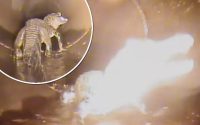White House calls swatting ‘dangerous’ after fake 911 call
WASHINGTON — White House press secretary Karine Jean-Pierre condemned the national spree of “swatting” calls Tuesday, after someone falsely reported to 911 that there was a fire at the executive mansion the day before.
The bogus calls are “creating a danger and a risk to our society,” Jean-Pierre said during a virtual press briefing.
The trend “is obviously a concern to us,” she added.
“This is something obviously the Secret Service is going to monitor very closely as it relates to us specifically at the White House or this administration.”
DC Fire and EMS received a call at 7:03 a.m. Monday claiming that the White House was on fire, prompting a dash to the site, where it was determined about 14 minutes later that there was no fire.
President Biden was at Camp David in Maryland at the time, and the Secret Service has not issued a statement on the incident.
The call was the latest to target a high-profile US politician and is likely to increase efforts to catch the perpetrator.

Similar calls saw police and other emergency personnel dispatched to the homes of judges and politicians from both major parties.
False reports intended to unleash a heavily armed response can be deadly — for example, a fake report motivated by a dispute involving the “Call of Duty: WWII” video game resulted in Wichita, Kan., police shooting and killing 28-year-old Andrew Finch in 2017.
Republicans swatted in the past month include Georgia Rep. Majorie Taylor Greene, New York Rep. Brandon Williams and Florida Sen. Rick Scott.
Democratic victims have included Boston Mayor Michelle Wu, billionaire donor George Soros and Maine Secretary of State Shenna Bellows, who ordered the removal of former President Donald Trump’s name from the state’s 2024 ballot last month.

Manhattan Supreme Court Justice Arthur Engoron, who is overseeing the civil fraud trial against Trump, and DC federal Judge Tanya Chutkan, who is overseeing the former president’s criminal trial for trying to reverse his 2020 loss, also were targeted — as was computer repairman John Paul Mac Issac, who distributed the contents of first son Hunter Biden’s abandoned laptop.
The motive behind the anonymous calls is unclear and officials have not described a suspect.
The calls bear similarities to other harassment campaigns, such as the 2016-2017 wave of phone threats made to Jewish institutions.
A teen living in Israel, himself Jewish, was convicted in 2018 of placing about 2,000 of those calls, admitting, “I did it out of boredom. It was like a game,” and claiming he was even paid in Bitcoin to make some threats.


